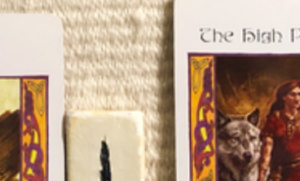Cultural Identity, Racism, and the Lens of “Us”
My dear friend and honored colleague Corvid Longcoat pointed me to this piece on “Ethnic and Cultural Identity” as defined by archeology in the early Celtic period as part of a larger discussion about racism in modern paganism, and particularly in the Norse/Heathen traditions. We engaged in discussion, and this blog post is the result.
The article examines the generalities of early historians (Roman, Hellenic, etc.) in describing “the barbarians” by various, and often interchangeable, names—”Celts”, “Germans”, and “Gauls” being the most commonly used. As these tribes also fought against the Roman and Hellenic armies in league with Scythians, Getae, and Galatai, people from a variety of geographical areas and cultural backgrounds were lumped together as one unit.
“In sum, the classical sources often mention the ‘Celts’ as an undifferentiated and largely unknown mass. When subdivisions are mentioned, the extent to which these reflect indigenous circumstances is entirely unclear. We may say with certainty that the classical authors considered the northern barbarians to belong to one very general cultural group or category, that the variation among individual ‘Celtic’ groups was poorly understood, and that the classical sources impose a view from without on a people who undoubtedly saw themselves in a very different light (Chapman 1992, 35).”
Which to me says that the classical authors fell into the same mental trap many modern researchers still fall into, which is that “our culture” is the only lens through which to view the world, and that all other cultures and societies are an indistinct mass of “otherness” and “not-like-us” which can be examined to take what we find appealing and to judge the “other” for what we perceive as cultural shortcomings or moral/ethical failings.
I would also infer that the various levels of confusion from the ancient writers, both in the inconsistency of naming the “other” and the inability to create a cohesive account of the culture, point to the likelihood that the people were organizing in smaller groups as a “tribe” or “clan” during that time in history, rather than in larger groups that we would call “race” (an artificial and not particularly useful term) or “ethnicity” (as a means of trying to capture a larger cultural context).
I appreciate the repeated emphasis in the article that race is an artificial, not genetic, construct. In terms of academic writing, “race” seems to become a commonplace of the late 18th to early 19th century, when, by curious coincidence, the rise of anti-slavery movements began in the UK and the US. The concept of a genetically determined and unalterable “race” grouping was suddenly quite useful to the pro-slavery contingent.
National identities, such as English, French, Spanish, etc., manifest earlier, mostly as a political phenomenon once the city-states of medieval Europe started consolidating into larger entities and declaring themselves a country ruled by a particular king or emperor. (Except Italy. Because, Italy. Uniting the disparate territories of the peninsula would take until the 19th century—the city-states flourished and functioned as their own small countries, and one was Florentine, or Venetian, or Milanese, etc., and that identity was glorified and defended as intensely as any national identity.)
The idea of national identity can also be fluid. For someone who becomes a naturalized citizen of France, even today, once you are a citizen of France, the Gauls become your ancestors. Not genetically, of course, but culturally and socially, because you have become a part of France, which derives its cultural and social identity from the early Gauls.



